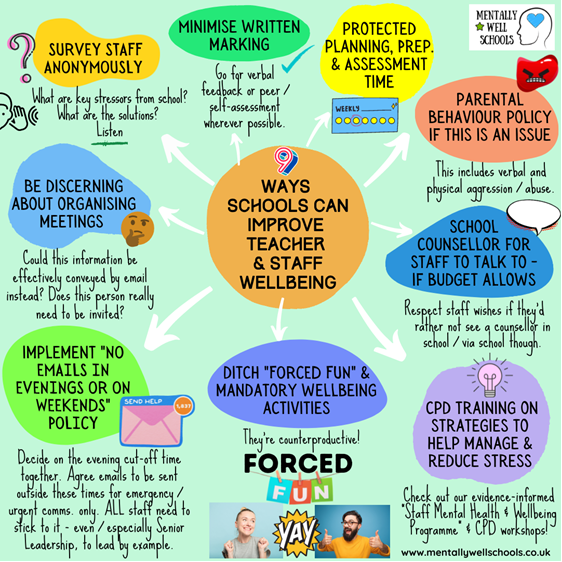Self-Help

Self-help
Whatever your role working in a school or educational setting can be tough on your health and wellbeing.
Remember self-care is not selfish, we need to look after ourselves and attend to our own needs so we are better able to look after the needs of others.
By practicing the NHS recommended ‘Five ways to wellbeing’ we can ensure that we stay the best version of ourselves we can be.
Step one: Connect.
Connecting with others can help us feel close to people and valued for who we are, as can connecting with nature and the environment around us.
- Take five minutes to ask how a colleague is doing.
- Give a colleague a lift or arrange a lift share.
- Get a lunch break and go outside to get fresh air and perspective
Step two: Get Active
Many people find physical activity helps their mental wellbeing as well.
- Take the stairs rather than the lift.
- Increase your daily step count.
- Try a short evening walk after eating or even some gentle squats in the kitchen, before you hit the sofa!
Step three: Take Notice
Some studies have shown that savouring ‘the moment’ can help you to feel more positive about life, while it can also help you sense when you need support or to de- stress. Take some time to enjoy the moment and the environment around you.
- Get a plant for your workplace.
- Have a ‘clear the clutter day’.
- Drive a different route to and from work, allow time to enjoy what you see around you, better still leave the car at home occasionally!
Step four: Learn.
Learning new things and skills keeps us healthy and increases our self-esteem.
- Search up some TED talks online about overcoming stress and anxiety.
- Take up a new hobby.
- Sign up for an evening class, ask some friends or family to join you!
Step five: Give
There has been a lot of research to suggest that giving of our time or resources to others can positively boost our immune system and wellbeing.
- Volunteer for a local charity or at work.
- Introduce yourself to a new starter at work and offer to show them around.
- Make a cup of tea for someone you recognise does not normally get much attention from colleagues.
- Look for ways to be kind. Your nice words or actions may just be what a colleague, friend or family member needs to hear today!
For more information 5 steps to mental wellbeing - NHS (www.nhs.uk)
Mentally Well Schools Resources
Signposting Additional Support Staff
Sleep Tips from Staff Programme
Tips for Speaking to Colleagues in Emotional Distress Staff Programme
COPE Skills from Staff Programme
Mental Wellbeing Practices
-
Happiful podcasts - mental health advocates share the passions that shape their lives, as well as thoughts on their own mental health in Happiful and Counselling Directory's podcast.
- How to be happy: a guide for teachers (and everyone else) (Guardian 9/12/2016)
- Lessons in resilience: earning your stripes - teacher support resources for developing resilience from Dr Emma Kell, author of ‘How to Survive in Teaching,’ on developing resilience.
- Calmer You - become your calmest, happiest, most confident self. Chloe Brotheridge knows what it's like to constantly overthink things, to feel nervous about everyday stuff and to let a lack of confidence hold you back from being yourself and being in the moment. Living with anxiety and low self-confidence is frustrating at worst, and a living nightmare at best.
- Mindful moment - Mindfulness can sometimes be found in the most unexpected places – but what about handwashing? Happiful explores five ways you can turn this hygienic ritual into a mindful moment
- Struggling to focus? Try this breathing technique to help clear foggy minds, and get you back on track.
- Forest bathing is the practice of totally immersing yourself in nature, and it has fruitful benefits. Here, with the help of a certified forest therapy guide, Happiful unearths the ways that exploring the great outdoors can support our wellbeing
- Showing gratitude for both the big and small things in our lives has the power to transform our state of mind and wellbeing. Life Coach looks at how gratitude benefits you and shares some of their favourite ways that you can start incorporating feel-good habits into your daily routine.
Burnout: Recognising the signs and protecting yourself

Education Support: Their Director of Programmes, Faye McGuinness, looks at how you can recognise the symptoms of burnout and shares tips to help you beat it.
How to spot burnout in teachers (educationsupport.org.uk)
The Building Blocks of Good Mental Wellbeing

Create healthy habits and a lifestyle that supports your mental wellbeing through a few simple steps taken at your own pace.
The building blocks of good mental wellbeing (educationsupport.org.uk)


